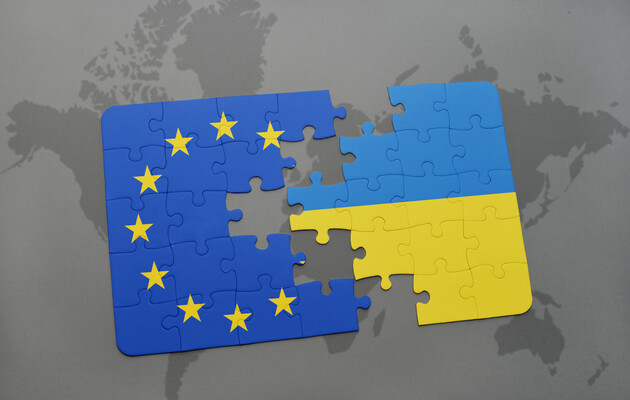Ukraine on the way to the EU: state of play and next steps

For six months of Russia's full-scale war against Ukraine, our relations with the EU have been tested for strength and at the same time have undergone dramatic changes. Defending its sovereignty, Ukraine found itself at the frontline of defending European values, at the core formation of a new strong Europe. At the end of June, EU leaders put an endto the issue of our country's belonging to the European family. And on September 5th, for the first time, we held a meeting of the EU-Ukraine Association Council in a new status as a candidate country for EU membership. The Ukrainian delegation headed by Prime Minister Denys Shmyhal presented clear proposals to the Agenda of Ukraine's accession to the EU. We act proactively, while our proposals are pragmatic and take into account the experience of other countries. We are sure that there is no time for bureaucratic delays either in the EU or in Ukraine. As Ukraine continues to reform in the context of a full-scale war, we expect decisive steps from the EU side for gradually fully integration of Ukraine into the EU internal market with its four freedoms.
Where are we now?
Europe today is on the verge of an unprecedented energy crisis, which will be the culminating test of the strength and solidarity of European democracies. As of today, the energy and security crisis on the continent, as well as the global food crisis, can be overcome only if we are closely integrated with the EU. Now this integration is actively ongoing - a "transport visa-free regime" has been launched between Ukraine and the EU, all import duties on Ukrainian goods have been abolished, "solidarity lanes" are activated so that Ukrainian agricultural products can meet the demand on the international market. The synchronization of our energy networks with ENTSO-E in March this year made it possible to gradually increase the export of clean electricity to the EU countries. We count on a significant increase in the volume of electricity exports in the future that will allow both to reduce Russian gas consumption in Europe and to maintain the liquidity of Ukraine's electricity market, as well as to help Ukraine in case of loss of capacity from generation this winter.
But to achieve the required level of integration is possible only with Ukraine's full membership in the European Union. Today, under the leadership of President Volodymyr Zelenskyy, the government and parliament are fully mobilized around this goal, prioritizing the implementation of the seven recommendations of the European Commission, which is a prerequisite for starting negotiations with the EU on enlargement. At this stage, we are already making a good progress. The head of the Specialized Anti-Corruption Prosecutor's Office has been appointed, there are first results in the selection of members of the High Council of Justice, the process of appointment of a new head of the National Anti-Corruption Bureau has been launched, the draft law "On Media" has been voted in the first reading, and we are finalizing the draft law "On National Communities of Ukraine".
Our preparation for EU membership will also be facilitated by the implementation of the Association Agreement. The central authorities have already prepared the necessary draft acts, the approval of which allows to implement the Agreement at the highest possible level, considering changes in the EU legislation and the economic realities of wartime. European integration draft laws are identified as priority at Verkhovna Rada.
The progress achieved allows us to talk about sectoral integration with the EU in specific areas. There was an officially enshrined possibility of Ukraine's accession from October 1 to customs conventions on the procedure of joint transit and trade facilitation on the sidelines of the Association Council. "Customs visa-free regime" will simplify the formalities at customs when exporting Ukrainian goods and, as a result, will support national business in conditions of logistical blockage.
In addition, during the Association Council, agreements were signed on Ukraine's participation in the "Customs" and "Fiscalis" programs. This is another step towards the creation of powerful customs and tax authorities of the European model. Ukraine is already Europe's leader in digitalization in both public services/ public procurement and the private sector. Now as our country has become a member of the EU program "Digital Europe" with a budget of 7.5 billion euros, we have the opportunity to implement even more projects, expand cooperation with international partners, synchronize faster with digital legislation and EU policies.
Agenda for joining the EU
I am very grateful to the European Commission and the leaders of the European Union, who quickly analyzed our application and the questionnaire required to obtain the status of a candidate for EU membership. Now it is critically important not to lose this pace of work. To do this, we must get strategic clarity on further steps after the implementation of the recommendations of the European Commission.
Even during my participation in the informal meeting of EU ministers responsible for European affairs, at the start of the Czech Presidency of the EU Council, it became clear that the European Union lacks an understanding of the modalities of future enlargement. There is an awareness that new approaches and ideas are needed.
Ukraine takes a proactive position on this issue. As with the candidate status decision, the "key to success" is to avoid over-bureaucratizing or conspiring the process. Therefore, at a meeting of the Association Council, we presented to European partners our vision of further steps, which consists of three components:
- Full integration of Ukraine into the EU internal market in parallel with enlargement negotiations. Opening for the country "four freedoms" of the European Union – in particular, for the free movement of goods, services, people and capital or payments – will help attract investment in the country, its economic recovery and overcome the negative economic consequences of the war. The integration process should be supported by Ukraine's access to financial instruments of pre-access assistance.
- Ensuring in Ukraine and the EU the necessary institutional capacity for effective dialogue within the framework of the enlargement policy. For effective work, each of the sides must clearly understand its counterpart.
- Initiation of official screening of Ukrainian policies for compliance with EU law. This is a necessary step that will allow us to understand the scope of tasks to prepare for EU membership and plan timely implementation of acquis communautaire.
After a detailed discussion of this plan, we count on its approval during the Ukraine-EU Summit.
We also look forward to the publication by the European Commission of an expanded assessment of our second part of the EU questionnaire on approximation of our legislation to the European one. This assessment will show where the implementation of the Association Agreement has allowed us to get closest to the rules of the European Union, and where we still need to work for future accession to the EU. Meanwhile, we are working to strengthen the existing structure of management of European integration processes in the government and increase staffing to prepare for negotiations and in the future — full membership.
The last six months have clearly demonstrated Ukraine's ability at the institutional level to effectively implement the European integration agenda even in the face of war. We also count on the EU to maintain the appropriate pace of decision-making, which is required by the current geopolitical situation on the continent. Both of these factors will make it possible to make Ukraine a member of the European Union.
Read this article in russian and Ukrainian.
Please select it with the mouse and press Ctrl+Enter or Submit a bug











 Login with Google
Login with Google